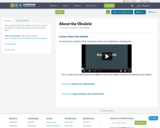
This is a lesson about the ukulele. It covers the sizes of the ukulele as well as the anatomy of the instrument itself.
- Subject:
- Arts and Humanities
- Material Type:
- Lesson
- Date Added:
- 01/30/2018

This is a lesson about the ukulele. It covers the sizes of the ukulele as well as the anatomy of the instrument itself.

Adebola and Jeaunita Olowe discuss Nigerian culture and dance and how they started an African dance company in the United States in this video from the Dance Arts Toolkit series.

Description about the Kaspar Project
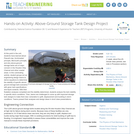
At this point in the unit, students have learned about Pascal's law, Archimedes' principle, Bernoulli's principle, and why above-ground storage tanks are of major concern in the Houston Ship Channel and other coastal areas. In this culminating activity, student groups act as engineering design teams to derive equations to determine the stability of specific above-ground storage tank scenarios with given tank specifications and liquid contents. With their floatation analyses completed and the stability determined, students analyze the tank stability in specific storm conditions. Then, teams are challenged to come up with improved storage tank designs to make them less vulnerable to uplift, displacement and buckling in storm conditions. Teams present their analyses and design ideas in short class presentations.
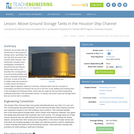
Students are provided with an introduction to above-ground storage tanks, specifically how and why they are used in the Houston Ship Channel. The introduction includes many photographic examples of petrochemical tank failures during major storms and describes the consequences in environmental pollution and costs to disrupted businesses and lives, as well as the lack of safety codes and provisions to better secure the tanks in coastal regions regularly visited by hurricanes. Students learn how the concepts of Archimedes' principle and Pascal's law act out in the form of the uplifting and buckling seen in the damaged and destroyed tanks, which sets the stage for the real-world engineering challenge presented in the associated activity to design new and/or improved storage tanks that can survive storm conditions.
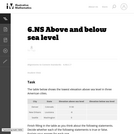
The purpose of this task is to help students interpret signed numbers in a context as a magnitude and a direction and to make sense of the absolute value of a signed number as its magnitude.
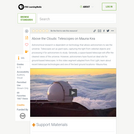
This video segment adapted from First Light explains why the highest peak in the Pacific, Mauna Kea, is an ideal site for astronomical observations. Featured are new telescope technologies that allow astronomers to explore the universe in more depth.

In planning this history lesson, determine if you want to cover this material in one or two class periods. The lesson focuses on Abraham Lincoln as a man and as a leader during the Civil War. The reading paragraphs have pictures and Word Banks to help students grasp the main ideas of the lesson. This lesson covers more advanced vocabulary than beginners will know, but it is not critical that the students produce every new word. The goal is to engage the students in the topic and help them learn the general knowledge included in the test items. For example, in the paragraph on the Lincoln Memorial, the students do not need to retain the information about the construction and historical use of the memorial. These details are introduced in order to demonstrate that even years after his death, Americans still honor Lincoln’s leadership in significant ways. Covers civics test items 60, 72, 74, 75, and 100.
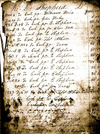
Lincoln, Abraham. 1858. "First Debate with Stephen A. Douglas." Excerpts of speech delivered at Ottawa, Illinois, August 21, 1858. https://www.nps.gov/liho/learn/historyculture/debate1.htm
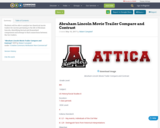
Students will be able to analyze two theatrical movie trailers for movies pertaining to the life of Abraham Lincoln, identifying factual and dramatized components and attempt to find connections between the two trailers.
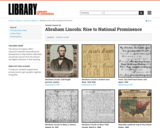
A selection of Library of Congress primary sources exploring Abraham Lincoln and his national role. This set also includes a Teacher's Guide with historical context and teaching suggestions. Speeches, correspondence, campaign materials and a map documenting the free and slave states in 1856 chronicle Lincoln���s rise to national prominence
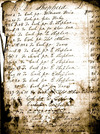
Statement by Abraham Lincoln and Dan Stone on the Subject of Domestic Slavery March 3, 1837
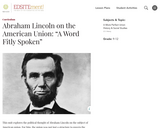
By examining Lincoln's three most famous speeches the Gettysburg Address and the First and Second Inaugural Addresses in addition to a little known fragment on the Constitution, union, and liberty, students trace what these documents say regarding the significance of union to the prospects for American self-government.
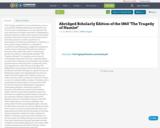
"The Tragedy of Hamlet" is, first and foremost, a text to be performed. William Shakespeare intended for the text to be seen in performance, not read, and all of the early texts have no reliable connection to Shakespeare's editorial authority.
In light of this, from the very earliest printings, editors have chosen to edit the play's text for particular purposes: to make a quick buck, to memorialize a recently deceased friend, to conform to a time period's unique aesthetic, or to attempt to reconstitute what Shakespeare might have intended in an ideal version of the play.
This particular edition is focused on the student who wants to read the play quickly. The edition is unabashedly abridged. "The Tragedy of Hamlet" is a long play, and, in a time of increasingly compressed curricula, a maximal edition can often take a long time to get through in class. Nearly all performances of the play, both on stage and screen, feel empowered to reduce the size of the play. The Zeffirelli film cuts the play's text by half. Moreover, if we use"Romeo and Juliet"s prologue as a guide that most of Shakespeare's plays were approximately two hours in length, then that suggests that "Hamlet," which can easily reach four-hour run-times in a "full-text" version, can be cut in half and still be coherent.
Therefore, this is a performative textual edition. It cuts the text by 50% but doesn't dumb down Shakespeare's language by modernizing spelling or altering the syntax. In particular, this edition has removed the Fortinbras subplot. Teachers and students should be aware that this removes a significant political theme in the play. It also removes a Hamlet soliloquy and a key foil for Hamlet's character.
This edition is based on the 1860 Globe edition because of its free availability. Later editions (both full-text and abridged) might eventually be offered that are based on a critical conflation of early texts in order to arrive at an ideal authorial-intent text.
Importantly, this edition has the advantage of including textual annotations to help the student understand difficult vocabulary, syntax, and cultural allusions. In this last regard, the edition attempts to be more useful than other online texts of the play that might be freely available but lack helpful guidance for the reader.
Other contextual material are provided to help the student understand early appreciations of the play.
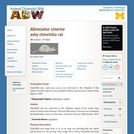
Abrocoma cinerea: Information
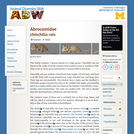
Abrocomidae: Information
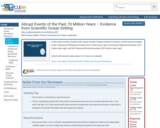
In this 6-part activity, students learn about climate change during the Cenozoic and the abrupt changes at the Cretaceous/Paleogene boundary (65.5 million years ago), the Eocene/Oligocene boundary (33.9 million years ago), and the Paleocene/Eocene boundary (55.8 million years ago).

In this activity, students work with paleoclimate proxy data (d18O, CH4, CO2)from the Byrd and GISP2 ice cores to investigate millennial-scale climate changes during the Last Glacial/Deglacial time periods. Students must prepare a publication quality plot of the data and answer several questions about the similarities and differences between the time-series (north-south phasing, amplitude, symmetry) and use this information to assess the bipolar see-saw mechanism for abrupt climate changes. Students are encouraged to read two journal articles for more information and to synthesize their results with other information from lectures and earlier readings.
(Note: this resource was added to OER Commons as part of a batch upload of over 2,200 records. If you notice an issue with the quality of the metadata, please let us know by using the 'report' button and we will flag it for consideration.)

So far, the rulers of Europe have been working to consolidate their power and expand their kingdoms, and this is it. The moment they've been working toward: Absolute Monarchy. We're going to learn about how kings and queens became absolute rulers in Europe, and where better to start than with Louis XIV of France, who is really the model for absolute rule.

In this seminar you will learn about the absolute value of numbers. You will learn how taking the absolute value affects both positive and negative numbers. You will use the techniques learned in this seminar to verify solutions to various other types of problems involving absolute value as you move forward. When looking at absolute value, you will identify how it can change a solution and the compare the difference that it makes in equations when there are multiple negative signs.StandardsCC.2.1.HS.F.2Apply properties of rational and irrational numbers to solve real world or mathematical problemsLearning TargetI can find the absolute value of a given number or numbers.Habits of MindPersistingCritical Thinking SkillAnalyze/evaluateAcademic/Concept VocabularyAbsolute valueNegativeNumber linePositive